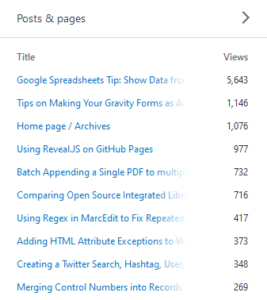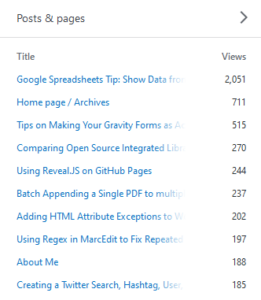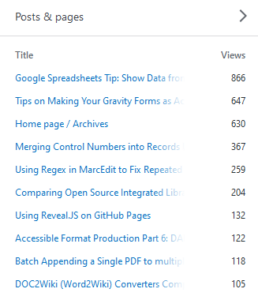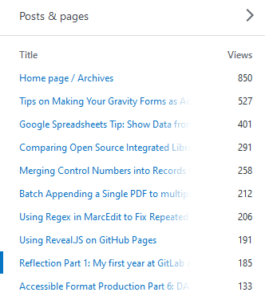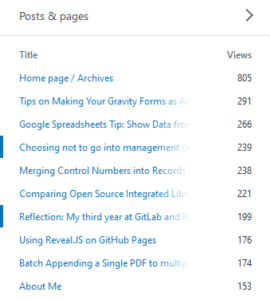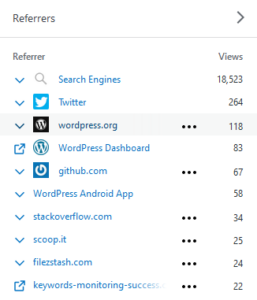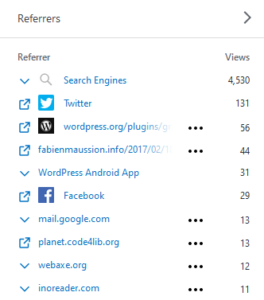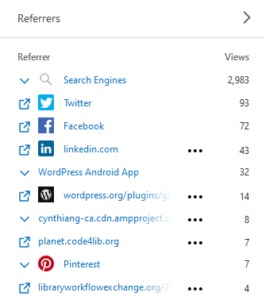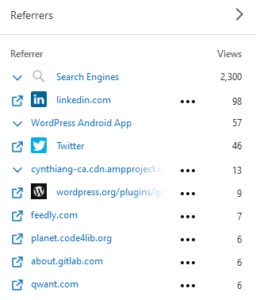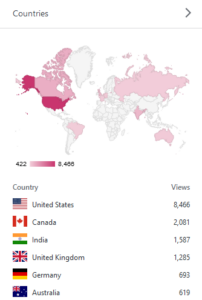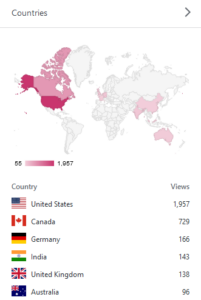I realized that I haven’t posted annual blog stats since WordPress stopped doing the reports back in 2015, so here’s a short post on the summary and some thoughts on the trends.
Annual numbers
A little sad to see when looking at the annual numbers next to each other to see the views and visitors counts going down each year.
| Year | Views | Visitors | Posts Published |
|---|---|---|---|
| 2016 | 24164 | 19079 | 24 |
| 2017 | 16580 | 12704 | 32 |
| 2018 | 7331 | 5331 | 12 |
| 2019 | 5283 | 3804 | 20 |
| 2020 | 5044 | 3594 | 5 |
| 2021 | 4411 | 3047 | 5 |
The number of posts I’ve made doesn’t seem to have made a difference in numbers, but that’s not surprising given what the most popular posts are (theory in next section).
Most popular posts
Year to year, my most popular posts seem to be some of the “how to” guides that I’ve written. Guides like:
- 2014: Google Spreadsheets Tip: Show Data from All Sheets in One
- 2014: Tips on Making Your Gravity Forms as Accessible as Possible
- 2014: Using Reveal.JS on GitHub Pages
- 2014: Batch Appending a Single PDF to multiple PDFs
Note that all of the posts are from 2014, but make up the top 5 in the earlier years, and most of them are still in the top 10 in 2021.
So my general theory for my blog stats taking a sharp decline is that most of the referrals (see next section) are from search engines. People are visiting for the specific article they’re looking for.
As those articles become older and less likely to show high up on search results, the more niche articles on using MarcEdit have started showing up in the top 5, such as:
- 2015: Merging Control Numbers into Records Using MarcEdit
- 2015: Using Regex in MarcEdit to Fix Repeated Subfields in MARC records
While these posts are on the older side too, MarcEdit is a tool specifically used by people within organizations that deal with MARC records, typically for batch editing. There are some great video tutorials on how to use it in general, but overall, there aren’t a lot of public materials (because for reasons unknown to me still, a lot of organizations have them behind login-only intranets). The articles I’ve published are also very specific use cases that may not be covered elsewhere.
Honestly, the one I don’t understand is how my ILS comparison blog post, Comparing Open Source Integrated Library Systems: Circulation Module of Evergreen & Koha, is still getting 200-300 views a year. Are these real people? bots? The report is from 2011 and both systems have had multiple major versions released since then, so it’s even more out of date than the swath of 2014 how-to guides.
In a way, having the popular how-to articles become less popular is not a bad thing for me personally. As all of those posts I mentioned become less popular, in the most recent years, I’ve had a better view into what’s popular of the posts I made the same year. In the top posts screenshots, there is a blue box at the beginning of the row for any posts that is from the same year.
You’ll notice there aren’t any until 2020 where my first year GitLab reflection shows up in the top 10. In 2021, 2 of my 3 GitLab related posts show up in the top 10.
Most popular sources (referrers)
As I mentioned above, most of the visitors are coming from search engines. Since it hasn’t changed much year to year, I’ve only included screenshots from even numbered years plus 2021.
Aside from search engines, social media, and WordPress, you get an interesting mix of referrers. WordPress does give me links to some of the sources, so here are some interesting ones:
- StackOverflow is listed in 2016 because back in 2015, it was linked as a comment to answer a question on hosting Reveal.JS presentations.
- Similarly, GitHub is listed because I link to it in my presentations project readme and it got forked a couple of times.
- The ‘fabienmaussion’ one is someone else who wrote an article on using Reveal.JS in 2017 and included a link to mine.
- Planet Code4lib for anyone wondering is an aggregate feed of a whole bunch of feeds, which anyone from the Code4lib community can add to.
- Webaxe shows up! It’s fairly low in the referrals for 2018, but it’s cool that I got a mention from them as one of the further reading articles on WCAG 2.1.
- In 2021, GitLab shows up! It doesn’t say which specific page, so I can only guess it’s from someone’s comment referring to one of my blog posts. It was definitely cool to find out some of the engineering managers read them!
Visitors by country
While interesting, not surprising that most of the visits are from either English dominant countries (US, Canada, UK, Australia), or countries where English is common (Germany, India). As such, I’ve only included the first year (2016) and last year (2021).
Thank you
Whether you’re a first time, infrequent, or regular reader, thank you!


